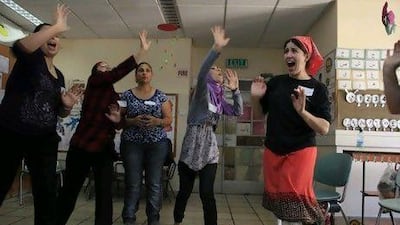'That's not a male 'No!'" the instructor tells the group of women circled around her. "Say it in a male voice, stronger: 'No!'"
The women try again, this time more assertively, an unequivocal sentiment bursting into the room. "But when can we say yes?" one woman later asks of the instructor, to receive the immediate reply: "You decide!"
This is the final class in a six-week self-defence course for women, by women in Wadi Joz, East Jerusalem. All the instructors are Jewish; all the participants are Palestinians from East Jerusalem and surrounding Palestinian villages.
It is the first time the workshop, run by a women's empowerment non-governmental organisation, El Halev, has been taught to Palestinian women - but it is unlikely to be the last. "I'm so happy I took this course," says 45-year-old Iman, from Silwan in East Jerusalem. "Now I want to give every woman in our community the chance to learn these things, too."
On the face of it, the class offers an unlikely scenario - Israelis teaching self-defence to Palestinian women in East Jerusalem, which Israel annexed after the war of 1967, in a move not recognised by the international community. But as the instructors point out, the aim is to teach skills to counter a problem that is common to all societies.
"We understand that violence against women is a worldwide problem," says Chana Weinberger, a professional self-defence instructor who leads the workshop in Palestinian East Jerusalem. "It doesn't matter which background or community you come from."
The Palestinian women taking part are community workers who are learning the skills of self-defence to pass on to their own groups. Some have already signed up for more intense training, building on the physical techniques taught at the workshop.
"We learnt things we didn't think about before," says Ghadeer, an education co-ordinator. "For instance, that you can use so many different parts of your body - like your elbows, the palms of your hands - as a way to defend yourself."
In a dynamic part of the workshop, Yudit, one of the Jewish instructors (and an El Halev founder), dons sunglasses and a baseball cap and poses as a male assailant for a role-play with the group. She "attacks" each woman in turn and they fight back using the methods they have learnt in these sessions: ramming his stomach with a sharp elbow or delivering a painful pinch to the soft undersides of the arms. The women practise different situations, in which the attacker springs from behind or rushes in front of the "victim".
In each case, the self-defence moves should be accompanied by loud, assertive shouts, Weinberger says. "It's like in a war," she says, using an example acutely close to home. "You make a lot of noise because it is confusing and frightening."
Statistics show that in all societies most assaults are carried out by someone known to the victim - in about 82 per cent of cases, says Weinberger. "It might be higher in closed societies, such as religious societies," she says, adding that she frequently runs workshops in ultra-Orthodox Jewish communities.
At the course in Wadi Joz, domestic abuse is addressed through role-playing, with women acting out situations in which the assailant is a husband or close friend.
"This is not easy to speak about or admit, so these role-plays can be challenging," Weinberger says. "We use role-plays to practise self-defence out loud, so that you learn the tools."
The women at the Wadi Joz workshop talk about the effects of being raised within what they describe as a culture of politeness.
"The problem we have is that all of us women are learning in our home to behave in a certain way," says one 40-year-old from Shuafat in East Jerusalem. "We are told, 'Don't sit like that' or 'Don't laugh like that'. We are told, 'Don't speak to your brother like that' and 'Don't talk to that boy'. It becomes a fear that affects everyone, so then the woman doesn't know how to deal with men - with her husband, her children, the man at work." The Palestinian women here all say they live in a culture in which it is somehow considered bad etiquette for females to shout, "No".
However, Weinberger believes this sort of social conditioning is far from exceptional. "It is something I see in every culture," she says. "I've been teaching Israelis, Americans, Russians, Palestinians, Dutch - they all are socialised in this way, as women."
As well as passing on the skills of self-defence, these Palestinian women say they have learnt how to behave not only in hostile situations, but also in everyday life.
"We are finding a way to put ourselves in the correct place," says Iman. "If we are strong, then we have more value in society. If I have a confident personality, I am of more value to my children, to my husband, to everyone."

